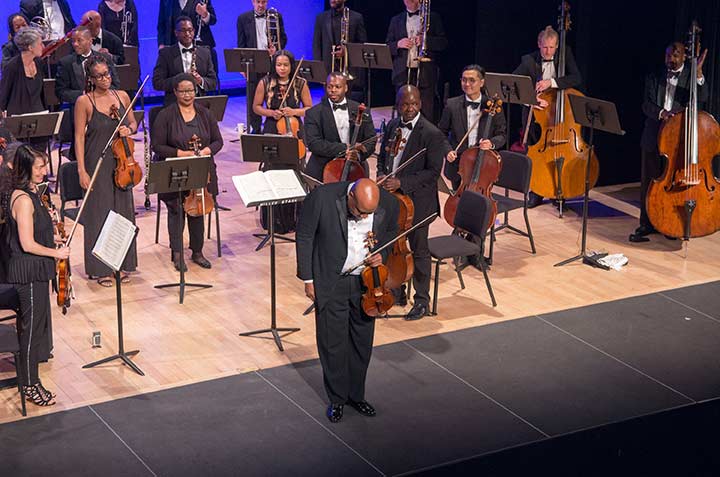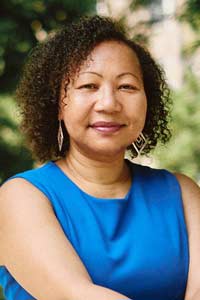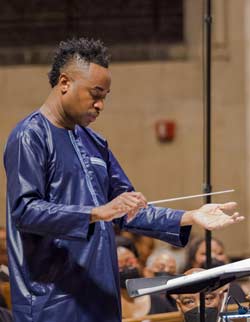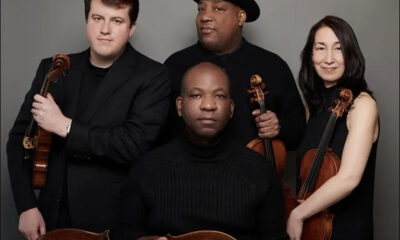Arts-Theater
Q & A with Liz Player

Executive and Artistic Director, The Harlem Chamber Players
on Harlem Songfest II, June 9th at 7PM at The Miller Theater at Columbia University – West 116 and Broadway in Manhattan
OTP: Liz, tell us about The Harlem Chamber Players and why you founded the organization:
Liz Player: I co-founded The Harlem Chamber Players in 2008 with the late violist Charles Dalton, he left the organization shortly afterward, and in 2009 my partner Carl Jackson and I joined forces and named our group The Harlem Chamber Players. I was inspired by the late Janet Wolfe, a Jewish woman who lived to the age of 101, and who founded and ran the NYC Housing Symphony Orchestra, a predominantly Black and Latiné orchestra, for over 40 years. She was a longtime patron of classically-trained musicians of color, and her work is the main inspiration for what I am trying to achieve now with The Harlem Chamber Players.

We will present Harlem Songfest II on Friday, June 9, 2023, at 7 PM at Miller Theatre at Columbia University. This concert will showcase some of Harlem’s favorite opera divas—sopranos Janinah Burnett and Jasmine Muhammad, mezzo-soprano Lucia Bradford, tenor Martin Bakari, and baritone Kenneth Overton. They will be accompanied by a 45-member orchestra comprising mostly members of The Harlem Chamber Players. This concert is presented in association with the Manhattan School of Music, and a few students from that conservatory will join the orchestra. The multi-talented IMG performing artist Damien Sneed is our music director and conductor for this.
If each performance offers a message for the audience, is there one for this presentation [Harlem Songfest II]. Or what would they want the audience to take away from it?
Our season finale concert, Harlem Songfest II, is a sequel to our first Harlem Songfest concert we presented in June 2018. This year, we are celebrating our 15th Anniversary Season by showcasing Black artists in “classical” music, a field that has historically excluded Black musicians as well as other musicians of color.

What I want for this concert is to uplift the audience by the beautiful operatic arias, spirituals, and songs. I want our community to feel empowered seeing and hearing phenomenal Black singers, most of whom are on the Met Opera roster, led by a talented multi-faceted music director and conductor, Damien Sneed. Our 45-piece orchestra is multi-ethnic, comprising professional classically-trained musicians, members of The Harlem Chamber Players, who are Black, White, Latiné, and Asian, modeling the diversity of our city and country. Music is a powerful force that brings us all together at the level of the soul, it is healing, and it can transform how we experience this world.
June is Black Music Month.
Any advice on how Black media can convey to parents, teachers that Chamber Music is “our” music, too?
Our last Harlem Songfest Concert featured all music by European composers sung by all Black opera singers. While we loved the music and how that concert turned out, this time around, we decided to also include Black composers, including women composers—Margaret Bonds, Dorothy Rudd Moore, Mary Watkins, Harry Lawrence Freeman, Scott Joplin, and Damien Sneed. We are celebrating Black Music Month and what we call “classical” music, including chamber music, orchestral music, and operas.
I absolutely believe this music belongs to all of us, even though I was not entirely convinced this was true even when I founded the group now known as The Harlem Chamber Players back in 2008. I wanted to bring classical music, namely chamber music, to Harlem, knowing that Harlem is already rich with culture. I fell in love with the clarinet and classical music while I was in middle school, and throughout middle school, high school, and college, I knew nothing at all about Black composers in the classical music arena. I listened mostly to Mozart, Handel, Brahms, Beethoven, Debussy, and Shostakovich. I grew up knowing very little about Black history, our American history, in general, and I feel cheated. It was not until very late in life that I learned about one of the first composers of African descent, Joseph Bologne, also known as the Chevalier de Saint-Georges, and that he even influenced Mozart. I did not know that the Czech composer Antonín Dvořák, who was credited with coming up with the American sound in European classical music, used to spend time listening to the baritone Harry T. Burleigh sing spirituals, the style which the composer later infused into his works. His famous “American” String Quartet was often called the “Negro” Quartet and worse by his detractors. In 1893 Dvořák famously stated in the New York Herald that “I am now satisfied that the future music of this country must be founded upon what are called negro melodies. This must be the real foundation of any serious and original school of composition to be developed in the United States.”
After spending most of my life with low self-esteem and not truly knowing who I am or what my background is, just learning this little bit about the influences of Black people in classical music opened up a whole new world for me. I’m learning a lot all the time from my peers, such as Terrance McKnight of WQXR, and Amadi Azikiwe, whose mother Armenta Hummings Dumisani founded the all-Black classical music festival, originally called “Gateways: Classical Music and the Black Musician.” The Sphinx Music Organization is also doing great work promoting diversity in classical music, creating more awareness and opportunities for Black and Latiné classically-trained musicians, who make up less than 4% of major symphony orchestras in the U.S.
Today there is even a major motion picture “Chevalier” about Joseph Bologne, the Chevalier de Saint-Georges. The Metropolitan Opera opened its 2021-2022 season with Fire Shut Up in My Bones, by Terrance Blanchard, the first opera by a Black composer to be performed by the Met since its founding in 1883. I was there in the amphitheater at Marcus Garvey Park for the live stream of the opening on the jumbo screen, and the mood of the audience was ecstatic for this long overdue production featuring Black people in opera.
Black people have contributed to every part of our culture, including “classical” music, and I believe that jazz itself is our American classical music. I love the artistry and soul that our people bring to this artform, the way that Harlem Renaissance composers and today’s Black composers infuse the Black vernacular into this artform, such as William Grant Still, Florence Price, Nathaniel Dett, David Baker, Adolphus Hailstork III, Tania León, Jessie Montgomery, and numerous others. One of my favorite chamber music groups, Imani Winds, is a trailblazer in today’s widespread practice of crossing genres. For years, they have been introducing incredible music for the traditional wind quintet (flute, oboe, clarinet, French horn, and bassoon) by commissioning many works by composers of color, including jazz composers.
The general public has long thought of chamber music and other “classical” music to be for the elite, and this perception might be why “classical” music is often viewed as a dying art form. Imani Winds helped make classical music hip. Today, especially after we suffered through the pandemic and the whole world finally witnessed the depths of anti-Black racism, we are forging a new era. Even the classical music industry is coming to terms with these times. (I put “classical” music in quotes because I do not entirely agree with the traditional definition of the term.) Music is universal and belongs to us all, and it is getting harder to box music into categories. The late Duke Ellington once said “There are two kinds of music. Good music, and the other kind.” – Bernice Elizabeth Green




